
|
|
|
|
Edward Carpenter as Celebrated by Simon Dawson |
|
Edward Carpenter was born into a comfortably wealthy English family in 1844, had a traditional education, and obtained a lectureship at Cambridge University with the inevitable Anglican Church ordination (a requirement for the post - despite Carpenter telling his Bishop he had problems believing in God). But this life did not suit Carpenter, and he went into a phase of deep unhappiness, until one day he resolved to "somehow go and make my life with the mass of the people and the manual workers". Some years of struggle followed, with Carpenter being short of money and short of love. He persevered however, and eventually managed to set up home in Milthorpe, a small village outside the industrial steel town of Sheffield, where he started a relationship with George Merrill who was to become his lover for over forty years. It was at Millthorpe that Carpenter then produced the whole stream of poetry, books and pamphlets for which he is mostly known today. Raj Ayyar: Many of Carpenter's books are not easily available in hard copy print anymore. What drew you to Carpenter? How did the website come about?
As for the website, it was a basic hobby at first, just a bit of fun. Countless teenagers sit in their bedrooms producing websites about Britney Spears or Liverpool Football Club. And I was a middle-aged gay man producing a website about my own personal hero. I don't want to claim for it any more than that. But as it has grown I have really enjoyed the contact I get with other enthusiasts through emails from all over the world. I got one a few months back from a fifty year old gay man who had read The Intermediate Sex as a deeply closeted teenager, and this had transformed his life. He had recently found a copy of the book on my website and could read it again. It was really good to be involved with that man in revisiting and revalidating such an important stage in his early life. Another woman had found a Carpenter poem - The Lake of Beauty - in the New Zealand Prayer Book. For her to do some research and find that this wonderful poem was written by a Victorian homosexual with pagan tendencies was a subversive act which Carpenter himself would have loved. Raj Ayyar: Like Walt Whitman, Carpenter had such a monumental breadth of outlook in his multi-visioned radicalism--socialist, open advocate of homosexuality, vegetarian, feminist. Today's status quo challengers are pygmies by contrast, focusing on narrow, piecemeal agendas and interests. Can we bring back some of that larger than life spirit of Carpenter and apply it to today's issues? Simon Dawson: Yes Carpenter wrote about a huge variety of subjects. In addition to your list he wrote on Art, Prison reform, Land reform, Christian theology, Hindu spirituality, Science, the Co-operative movement, urban air pollution, the design of better homes for the poor, and vivisection. Not forgetting a "Proof of Taylor's Theorem in the Differential Calculus", various piano compositions http://www.edwardcarpenter.net/index.htm#music , a book of Socialist marching songs http://www.edwardcarpenter.net/ecmusic.htm#chants , and over four volumes of poetry. See http://www.edwardcarpenter.net/ecddbib.htm for a nearly complete list. I think what is important is to burrow down to the core values at the root of all of this work. Although he wrote about many topics I feel that he expressed the same deep values in all his writings, and it is those deep values we respond to today. In his writing on spirituality Carpenter was trying to get behind the individual detail of each religion's mythology to find the common core values of all religious searching, what Paul Tillich calls the Source of Being or Faith, "that which is of Ultimate Concern". That is a huge theme for spiritual searchers today. But even deeper that that there is the call to Democracy. This word doesn't just mean the political system of how we vote for our leaders. It goes deeper. Democracy is the fundamental recognition of the individual value and worth of each individual being: rich or poor, black or white, male or female, gay or straight. All people are of value and fundamentally equal. To Carpenter enabling people to grow and to flourish was a fundamental good. It was unthinking social institutions which held people down and damaged their growth, and these were the things he wrote about and criticized. As for today's campaigners I am not hugely bothered about whether they go for a big picture or narrow focus, as long as they maintain that democratic respect for humanity and otherness deep in the core of their work. Raj Ayyar: In her essay 'Loving Well: Homosexuality and Utopian Thought in Post/Colonial India' (Queering India: Same Sex Love in Indian Culture and Society ed. Ruth Vanita. NY and London: Routledge, 2002), Leela Gandhi places Carpenter within the context of dissenting Western anti-colonial discourses of the 19th Century. She quotes his diatribe against Empire and other shackles: "The men who have sway over the world today" were men "to whom it seems quite natural that our marriage and social institutions should lumber over the bodies of women, our commercial institutions grind over the bodies of the poor, and our 'imperial' enterprise over the bodies of 'barbarian' races" (Quoted by Gandhi in Queering India, p. 91). What's your take on Carpenter's marvellous fusion of different oppressions in the same passage? Simon Dawson: This is exactly the point I make in the previous answer. Leela Ghandi is an Indian woman writing about colonial politics and sexuality. I am an English gay man interested in post-modern Christian theology. We are coming at Carpenter from hugely different directions. Yet we can both love his work because of the sheer breadth of his vision. And we can both respond to his analysis of how social institutions damage human individuals, and respond to his refusal to accept it. Raj Ayyar: Walt Whitman's Leaves of Grass made a profound impact on Carpenter and his work. In his brief Carpenter bio on the website, Phillip Taylor notes that "Whitman's democratic poetry provided the spark that set Carpenter on the path of socialism." How did that happen? Simon Dawson: Whitman made a big impression on Carpenter, but I suspect the Socialism came second. Sexuality was the first driving force. Carpenter first came across Whitman's poetry whilst at Cambridge when he was deeply unhappy. I don't claim to be an expert in this field, but I suspect he was clinically depressed due to the unresolved issues around his sexuality. The poems therefore made a big impression: "From that time forward a profound change set in within me. I remember the long and beautiful summer nights, sometimes in the College garden by the riverside, sometimes sitting at my own window which itself overlooked a little old-fashioned garden enclosed by grey and crumbling walls; sometimes watching the silent and untroubled dawn; and feeling all the time that my life deep down was flowing out and away from the surroundings and traditions amid which I lived - a current of sympathy carrying it westward, across the Atlantic. . . . . . What made me cling to the little blue book from the beginning was largely the poems which celebrate comradeship." (From My Days and Dreams - Carpenter's Biography, Chapter 3) ( http://www.edwardcarpenter.net/ecdd3.htm ) My perception is that it was issues around his sexuality that caused Carpenter to drop out of academia and set up amongst the working classes, and Whitman was a huge catalyst here. But once in Sheffield it was only natural for a man with Carpenter's democratic sensibility to join in the already active Socialist movement in those Northern towns. Raj Ayyar: Carpenter was associated with the Women's Freedom League formed in 1908. Can you tell us a little bit about his feminism? Did he see any overlap areas between the oppression of women and the oppression of gays? Simon Dawson: Carpenter's views on feminism are probably best given in his book Love's Coming of Age. (Unfortunately the text is not on the website yet - it is second on my list to do - after "Visit to a Gnani"). Carpenter's book on Homosexuality (The Intermediate Sex - http://www.edwardcarpenter.net/ecinttit.htm ) - is however on-line. The core theme is the same in both books - the damage caused by society to women or gay men through the unthinking imposition of unnecessary rules and conventions. Women were being damaged by society refusing them access to the challenge of a meaningful education or career, and also frequently by their inability to access a meaningful sex life. Gay men were damaged by criminal sanctions, and a similarly distorted sexuality. I think it was Carpenter's personal experience of his own sexual repression that helped him recognize the psychological symptoms in the women around him, a depression following on from a lack of any true meaning to their life. Carpenter was in one way an outsider from society, and in another way deeply experienced in how the English establishment worked. He was in an ideal position to question those rules and conventions that most other people took for granted. Nevertheless it took some courage to write about these issues at that time. What is also fascinating about the book on homosexuality is that Carpenter reinforces his argument with a long anthology of writings about homosexual customs from all over the world. These anthologies are in a lot of his books: on Literature (Iolaus - http://www.edwardcarpenter.net/ecinttit.htm), on the interface of spirituality with homosexuality (Intermediate Types among Primitive Folk - http://www.edwardcarpenter.net/ecpftite.htm ) and on gays in the military (same book chapter 5 onwards). Even if you don't get on with Carpenter's ideas then these books are fascinating simply for these long lists of reminders of our gay history. Raj Ayyar: Given Carpenter's outspokenness on gay issues, was he ever persecuted or witchhunted after the Oscar Wilde trials of 1895? Simon Dawson: He managed to survive fairly well. Carpenter knew the establishment and knew how to keep his head down. Living out of the way in Sheffield helped. Carpenter had written his first pamphlets on gay issues just before the Oscar Wilde crisis, and so he found that for a few years publishers refused to take on his more mainstream books such as Love's Coming of Age, but that was really the limit of the problem. Society has many ways to control what it does not like however. One way is to get angry and destroy you, which it did to Oscar Wilde. The other method is to make fun of you and then ignore you, and this happened to Carpenter to a certain extent. It was easy to make fun of his more exotic enthusiasms, such as vegetarianism and the wearing of sandals, and use that as an excuse not to engage with his much more serious books on sexuality and social reform. To a certain extent that is still happening today, and one senses that Carpenter, one of the key figures in early British socialism, is a bit of an embarrassment to many people in the modern Labour Party.
The basic narrative is that Forster met Carpenter and Merrill, and had some form of transformative experience that released him to write the books that he did. As for what actually happened, I think two aspects are important. There is no doubt that Merrill was a deeply outgoing, physical and sexual man, and to be in his presence could be a powerful experience. But I think there is another aspect also. Carpenter set up house at Milthorpe and received all sorts of visitors: "It thus became possible to realize in some degree a dream which I had had in mind for some time - that of making Millthorpe a rendezvous for all classes and conditions of society. I had by this time made acquaintances and friends among all the tribes and trades of manual workers, as well as among learned and warlike professions. Architects, railway clerks, engine-drivers, signalmen, naval and military officers, Cambridge and Oxford dons, students, advanced women, suffragettes, professors and provision-merchants, came into touch in my little house and garden; parsons and positivists, printers and authors, scythesmiths and surgeons, bank managers and quarrymen, met with each other. Young colliers from the neighboring mines put on the boxing-gloves with sprigs of aristocracy; learned professors sat down to table with farm-lads." (My Days and Dreams - Chapter 9) There is not much written in the published papers, but having read some of the unpublished letters and documents from this time I suspect there was a fair amount of sex going on amongst the games and genteel conversation. If Forster was part of this network, than that too could be transformative, in a more subtle and gentle way. I think it is likely that both types of experience were important in Forster's catharsis. But when you and I both explore the myth I can see how you, with your background, would focus on Merrill and the energy of his body, whereas I am interested by the second aspect, as this has many parallels with the way my own life has been transformed by membership of the Edward Carpenter Community. Whilst were on this subject Raj, have you seen this website (The Gay Succession - http://www.gaysunshine.com/exc_gaysuccess.html) which is another wonderful narrative, but which gives a bit of additional content about Carpenter's own views on sex. Raj Ayyar: Carpenter's concept of gays and lesbians as 'the intermediate sex' may have been influenced by the eugenics and evolutionism of the Victorian context. However, there is surely a sense in which one could argue that, for him, the 'third sex' offered a utopian possibility of transcending the limitations, patriarchal conditioning, conformity and narrowness of the standard straight 'male'/'female' dichotomy (Leela Gandhi makes a similar point about Monique Wittig's The Straight Mind. See Vanita (ed.) Queering India, p.88-89). How do you evaluate Carpenter's theory of the 'intermediate sex'? Simon Dawson: I am not sure I agree that Carpenter argued for a utopian transcending of society. In Intermediate Types among Primitive Folk Carpenter argues that gay men had a specific and definite role within society. It was just that through the mistaken Judeo-Christian negativity about sex, that history has been deliberately suppressed and forgotten.
Raj Ayyar: Carpenter was rediscovered in the '70's by feminists, gay activists and others. What is his ongoing relevance to the gay community today? Simon Dawson: This is a difficult question to answer. I have learnt through hard experience that Carpenter is a tricky writer to talk about, as everybody finds something different to respond to. I know what interests me in his work, but other readers may find very different inspirations. For me personally there are two key things he taught me. Firstly, do not forget your own history. Carpenter was a scholar who spoke Greek and Hebrew, and he can tell us the story of gay men from thousands of years ago - the true story, not the later distortions of organised religion. The second one is simply stated but more difficult to do - the importance of the personal journey of self knowledge, self-acceptance and self love. Raj Ayyar: I noticed your website entry about you and your partner David Mooney going through a 'ceremony of commitment and blessing' at St. James's church, Piccadilly. How does such a ceremony differ from a gay wedding? What are your views on gay marriage? Simon Dawson: I am not hugely worried about the name; it is what the ritual contains that is important. One element is the making of promises between the two partners within a couple. But there is a second element, which is the recognition and affirmation of the couple by society, and by their family and friends. That's why we called it a covenant AND blessing - David and I made the covenant; our friends and family were generous enough to give it their blessing. I think any such ritual needs to contain both elements. I think it hugely important to have such rituals available to those that want them. As for what you call them -"a rose by any other name"!
The second idea may be more interesting. I am thinking of setting up an Edward Carpenter email discussion group. I get quite a few emails from people asking if there is any club or society they can belong to to learn more about the man. Perhaps an email bulletin board might help with that need. I hope to progress that idea later this summer, so if anybody is interested send me an email now and I will keep you informed. |
|
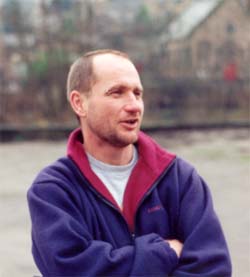 Simon Dawson
Simon Dawson 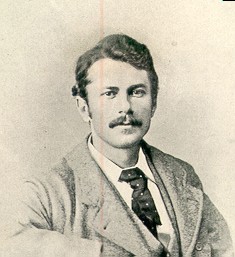 Edward Carpenter, 1875
Edward Carpenter, 1875 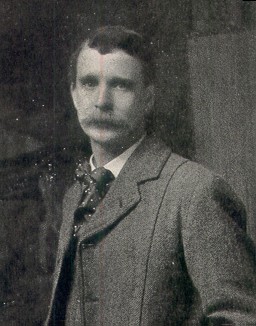 George Merrill, Edward Carpenter's partner of 40 years
George Merrill, Edward Carpenter's partner of 40 years 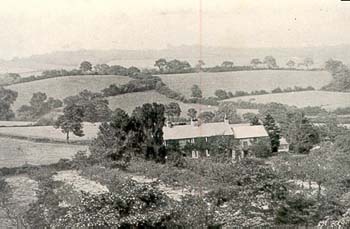 Millthorpe
Millthorpe 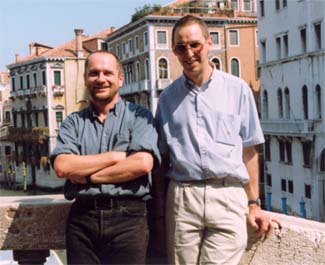 Simon Dawson travels with his partner, David
Simon Dawson travels with his partner, David